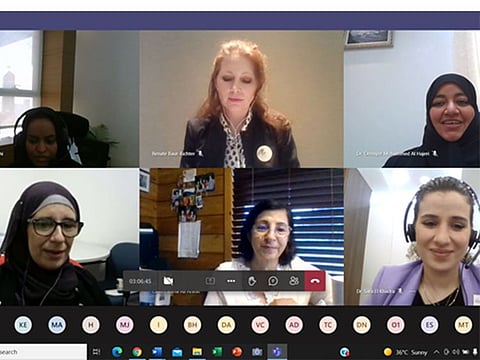Destigmatisation of COVID-19 urged as UAE panel discusses emotional burden
Need to decrease feelings of shame, greater support for isolating patients stressed

Also In This Package
Abu Dhabi: The emotional burden of COVID-19 on patients and their families came up for discussion at a special panel organised by the Abu Dhabi Public Health Centre (ADPHC) on the occasion of World Mental Health Day 2021 yesterday, even as panelists urged for the destigmatisation of the disease.
Although many COVID-19 survivors reported feeling more centred following a bout with the infectious disease, the panel said some who are isolating during the infection period require more emotional support.
“For our study, we interviewed 28 people who were infected with COVID-19 last year, and found that the disease created both positive and negative effects. Among the negative impacts were feelings of isolation, loneliness, stigma and anxiety, as well as the guilt of contracting the infection. And while the anxiety about short- and long-term effects of the disease has been widely reported, there is less understanding and support for patients who are infected,” said Dr Iffat El Barazi, assistant professor in health promotion at the United Arab Emirates University (UAEU).
“Perhaps this has [improved] over time as more people have been infected, but there is still a need for further support and normalisation of the condition,” she added.
Concern about impact
Dr El Barazi was discussing the findings of an eight-month qualitative study undertaken by the UAEU in 2020, which focussed on both physical and mental wellbeing among COVID-19 patients. Like most other patients, participants in the study reported fever, pain and loss of taste and smell as regular physical symptoms of the condition. They also said that symptoms like hair loss and menstrual changes left them anxious about the long-term effects of the disease.
Positive takeaways
“This is not to say, at all, that patients did not report positive effects. In fact, patients in Abu Dhabi appeared very happy with the physical and medical support they received. One respondent even expressed gratitude for having been infected in the UAE, with all the support she received and the health authorities being a call away. Others said they were able to connect with loved ones as they isolated, were able to spend time on self-reflection, and even came out of the infection with [renewed appreciation for] a healthy lifestyle,” the researcher said.
But respondent COVID-19 patients also reported dealing with feelings of anger, sadness, guilt, shame, depression and anxiety.
“Of course, this may have changed as the pandemic progressed and more people were infected. But the mental health burden on patients still exists. Some people said their neighbours stopped talking to them, especially in the initial stages of the pandemic. So there is still a requirement for social and psychological support during the infection period and time of subsequent recovery,” Dr El Barazi said.
She recommended de-stigmatisation of the disease.
“We need to decrease the feelings of shame and stigma. We also found, in another UAEU study, that Emiratis who used social media to find out information about COVID-19 experienced significantly poorer wellbeing, so there is a definite need to use reliable sources of information on order to counter anxiety regarding the disease,” Dr El Barazi.
COVID-19 champions
Other public health officials on the panel said it helped to hear from people in positions of leadership.
“We had people we looked up to talking about their experience with COVID-19. Using them to ‘champion’ the experience was uplifting,” said Dr Sara El Khadra, community health specialist at the ADPHC, public health wing of Abu Dhabi healthcare sector regulator, the Department of Health (DoH).
In fact, a championing strategy was used in the UAE in 2020 to discuss COVID-19 survivors in a bid to uplift the rest of the community.
Verified information
Panelists also advised more efforts to ensure people receive verified information about what to do during a public health crisis.
“A lot of the anxiety stems from people not knowing what to do, and this is why [the recent ADPHC campaigns] have been very beneficial,” said Dr Cairo Ali Arafat, senior advisor at the Early Childhood Authority.









